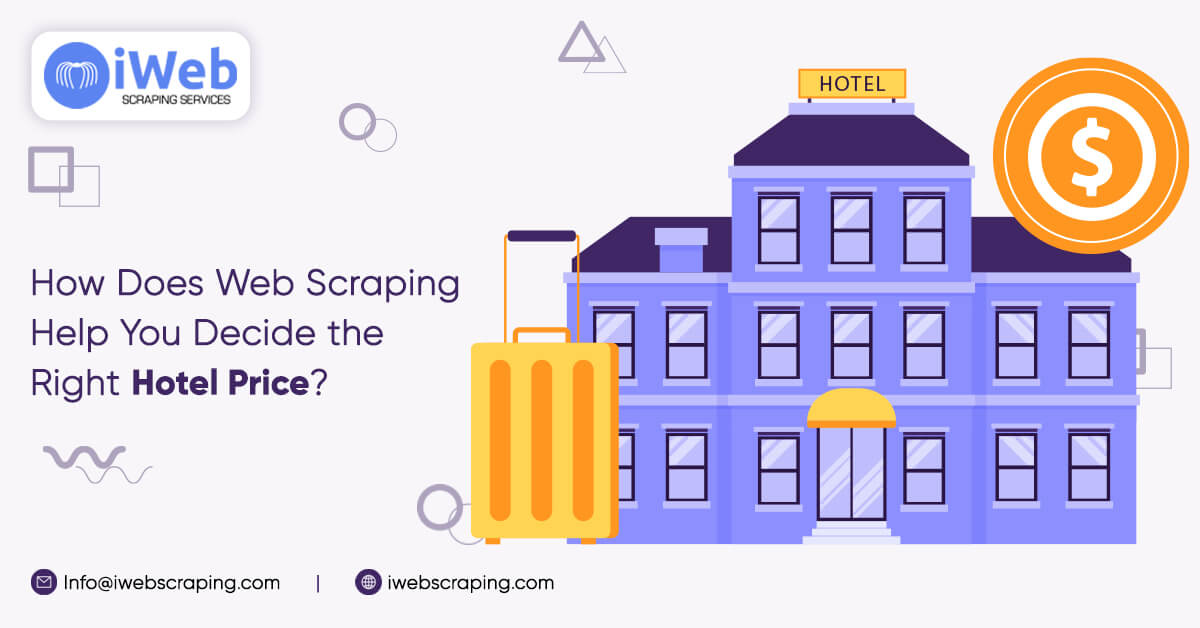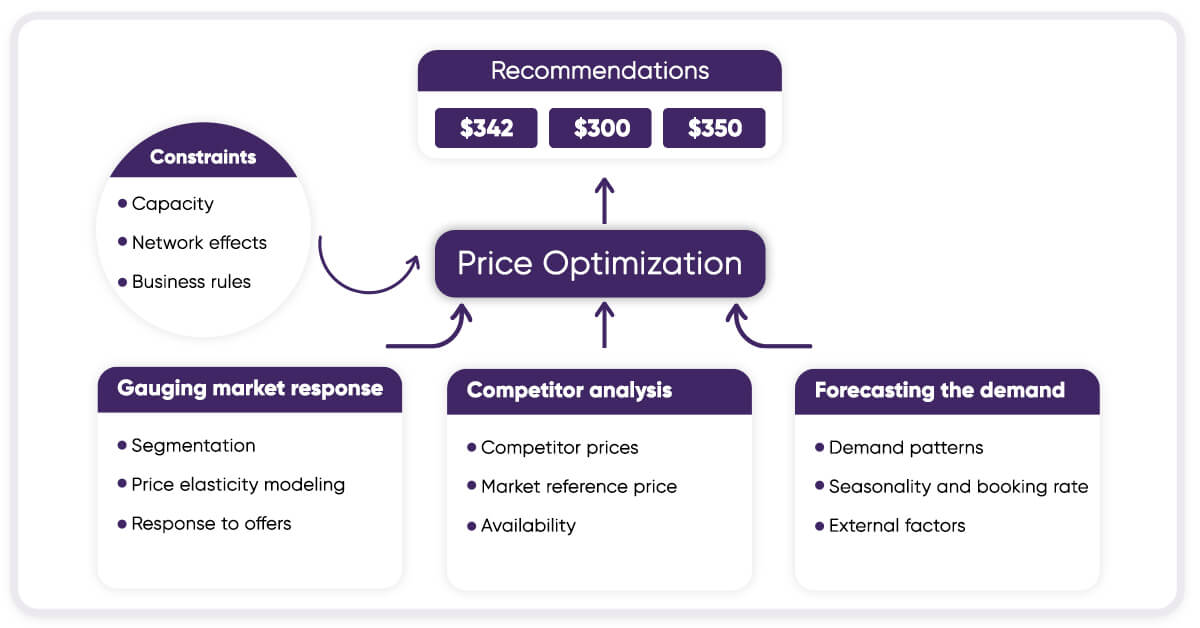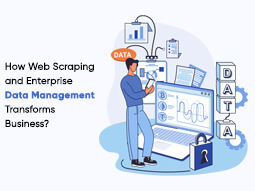How Does Web Scraping Help You Decide the Right Hotel Price?

The hospitality business has been continuously expanding for decades and shows no signs of slowing down. Travelers that are tech-savvy use the internet platforms to plan, book, and experience their journeys. To never get left alone, the hospitality sector is rapidly grasping the idea of data analytics and various ways in which incorporating web data into hotel pricing may aid revenue growth and improve customer experience.
What is The Use of Web Data in Leveraging Hotel Pricing?
Today's informed buyers always do extensive research. Before making a purchasing decision, they examine pricing from several websites. To respond to these active consumers, scraping pricing information, particularly in the hospitality industry, has exploded over the years. Consumers may compare costs across companies in only a few clicks using these websites. As a result, pricing pressure between enterprises becomes more intense. Dynamic pricing is used in this situation.
Dynamic pricing, which may be used in a variety of industries including e-commerce and hotels, is a highly effective yet underused revenue management solution. It is a surefire method of boosting a company's financials by increasing revenue and profitability. Dynamic pricing strategy is already being praised as a "game-changer," particularly in competitive industries.
It's difficult to set a price. Many hoteliers deal with determining proper ratio among overselling and inflating prices. They can enhance profit by adjusting room pricing daily, weekly, or even minutely using web data from hotel price scraping.
Factors that Influence Hotel Pricing Dynamics
The goal of a hotel pricing plan is straightforward: to maximize the result. However, administering this complicated pricing scheme is quite difficult. It is dependent on several factors, including:

Most of the hotel pricing is determined by bookings and client demand. If a hotel anticipates a high volume of bookings around a specific event, it can raise the price of its rooms and still sell out. Similarly, if the predicted occupancy isn't met, hotels reduce the rate close to arrival.
2. Type Of RoomYou would always expect a hotel’s suite room to cost similar rates. That would not be the case as every room will have a distinct rate, reviews, ratings and offers with different benefits. For instance, a beach view room will always be expensive than a room with a parking view.
3. Discounts OfferedTravelers always look for discounts and bargains that will help them save money. Social media ads are an effective way to remain ahead of the competition.
4. Competitor RatesHotels frequently aim to match their competitors' prices to boost income. It assists businesses in strategically positioning themselves next to their clients by considering current market situations.
5. Booking Time/DateHotel costs are dependent on how advance the client books the rooms. Many times, customers that wait until the last minute frequently get great offers at the lowest possible cost.
6. Season VariationsDuring the off-season, hotel room rates in popular destinations will be lower. These businesses will increase prices during peak season to boost profit before demand declines.
7. Demand PredictionFixing the "correct price" necessitates extensive planning. To effectively price the hotel room, managers must first have a strong idea of the production volumes for each day.
8. Network EffectThe sharing economy is when a service's demand and value result in an increase of more individuals using it. In simple terms, the network effect is a result of your hotel's popularity. Consumers are willing to spend a higher price to remain at a well-known location.
9. Business RuleThe hospitality business is closely monitored by regulatory agencies such as the government. The hotel industry's pricing strategy should adhere to the price guidelines and rules.
Through hotel data scraping, the above criteria will be retrieved and turned into useful, possibly the best, and useful data.
10. Central LocationThere is indeed a lot more competition for hotels that are in the heart of the city or near renowned tourist attractions. Similarly, if the hotel conducts big workshops or meetings, hotel rates will rise.
The above criteria will be scrapped and turned into useful, possibly the best, and useable data via hotel data scraping.
What kind of Pricing Strategies are Used by Hotels to Offer the Right Price?

Dynamic prices have various benefits for the hotel industry.
- Increase Revenue per room, average daily rate, Revenue per available room.
- Increase Revenue per room, average daily rate, Revenue per available room.
- Increase the effectiveness of the pricing process by automation, which makes things simpler, quicker, and more accurate.
- Allow opportunity for experimentation with the "high to low" strategy, in which a hotel offers premium prices early in the day and then reduces them later if demand does not develop, as opposed to the "low to high" method, in which the price is raised dependent on the number of bedrooms reserved.
So, How Do You Gain Popularity with a Dynamic Pricing Strategy?

It's based on a fast, dependable supply of high-quality data scraped from hotel websites. Real-time pricing parameters of various websites are monitored by web crawlers.
Hotel web scraping will help to predict the high or low demand. During low demand, prices are reduced to attract guests to book empty rooms. Hotel rates, on the other hand, remain high during peak season or important local events. Even during the failure of the initial projection, the price can be swiftly changed to account for economic market fluctuations.
Web scraping can also be used for several other purposes, apart from rate management:
- Informative analytical data
- Necessary reports
- Data-driven approaches
For competition analysis, web scraping APIs is commonly employed. It provides actionable information that can help businesses keep one level ahead of business competitors. It's a good idea to keep an eye on your competitors' pricing to see how the market will react. Companies can select between a premium business model and a premium price approach based on market trends.
A truly dynamic pricing strategy will be more tailored and adaptable. That is, prices will differ from one buyer to the next depending on their purchase decisions. Customer behavioral data, such as spending patterns and desire to shop about for a better deal, can be harvested through web data scraping.
Pricing intelligence technologies are being used by an increasing number of hotels to help them alter their companies. You may gain more insights and understanding about client preferences and demand curves if you have the relevant data from extracting hotel prices. Pricing settings can be altered continually based on this knowledge to extract additional value for your company.
Which are the Best Ways for Hotels to Use Online Data to Develop Pricing Strategies?
This is how dynamic pricing should be done. The hospitality industry's intense competition has rendered the set premium pricing policy ineffective. The key to major financial gain is dynamic pricing.
Preparation, pre-modeling analysis, and designing and building the pricing model by altering the variables and preparing client communications are all necessary steps in establishing up a dynamic pricing strategy. Clients are increasingly putting money into advanced data analytics. Companies can use third-party network operators if this proves to be a costly burden.
Do you wish to own such dynamic pricing policies?
Contact our experts at iWeb Scraping for effective and reliable web scraping services.




